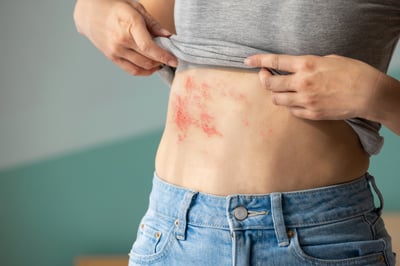
After covering Rash 101, we thought it would be a good idea to cover another type of rash, ringworm. Although this could have been shortly covered in Rash 101, we felt it needs its own moment in the spotlight because of its common appearance in summer, and its level of contagiousness.
According to Andrea Garrett, MD, a board-certified Dermatologist with Forefront Dermatology in St. Louis, Missouri, “a common worry with ringworm is that you may immediately think you have worms, or this rash was caused by worms. In reality, neither is the case. Ringworm is actually a skin infection caused by a fungus. The name signifies the visual signs of this rash which includes a ring-shaped pattern that features a raised and scaly boarder.”
Ringworm has the ability to occur anywhere on your body. While the general name is ringworm, the area it is located on your body will change the name. If it occurs on your feet, it is athlete’s foot. If it occurs in your groin, it is known as jock itch. If it lands on your scalp, it is scalp ringworm.
How do you get Ringworm?
Ringworm can happen to anyone, anywhere. It is not a regional problem. Your chances increase though if you live in a tropical area, spend time in hot and humid weather, or sweat heavily. It is also more common for people who play contact sports including wrestling and football.
Ringworm is also possible to contract when you come in contact with an infected individual or animal that is carrying the skin infection. Ringworm is actually the most common skin disease seen in cattle, and is also seen in dogs and cats.
How can I prevent getting Ringworm?
According to the Mayo Clinic, the first step to prevention is education. Be aware of the signs, and make sure to teach children what to watch for and how to avoid it. Next, stay cool and dry. Avoid wearing thick clothing for long periods of time when the weather is warm and humid. Lastly, avoid sharing personal items. Sharing items such as clothing, towels and hairbrushes can spread ringworm.
Treatment is Key
Ringworm is an extremely contagious skin infection, and it is important that you prevent spreading it to others. Without treatment, the rash tends to grow and cover a larger area or possibly infect other areas of your body. If you suspect that you may have Ringworm, visit your local Forefront dermatologist for treatment. According to Dr. Garrett, “ringworm is typically treated with antifungal medicine like a cream, ointments or sprays. If it covers a large portion of your body, sometimes a prescription pill is necessary.”





